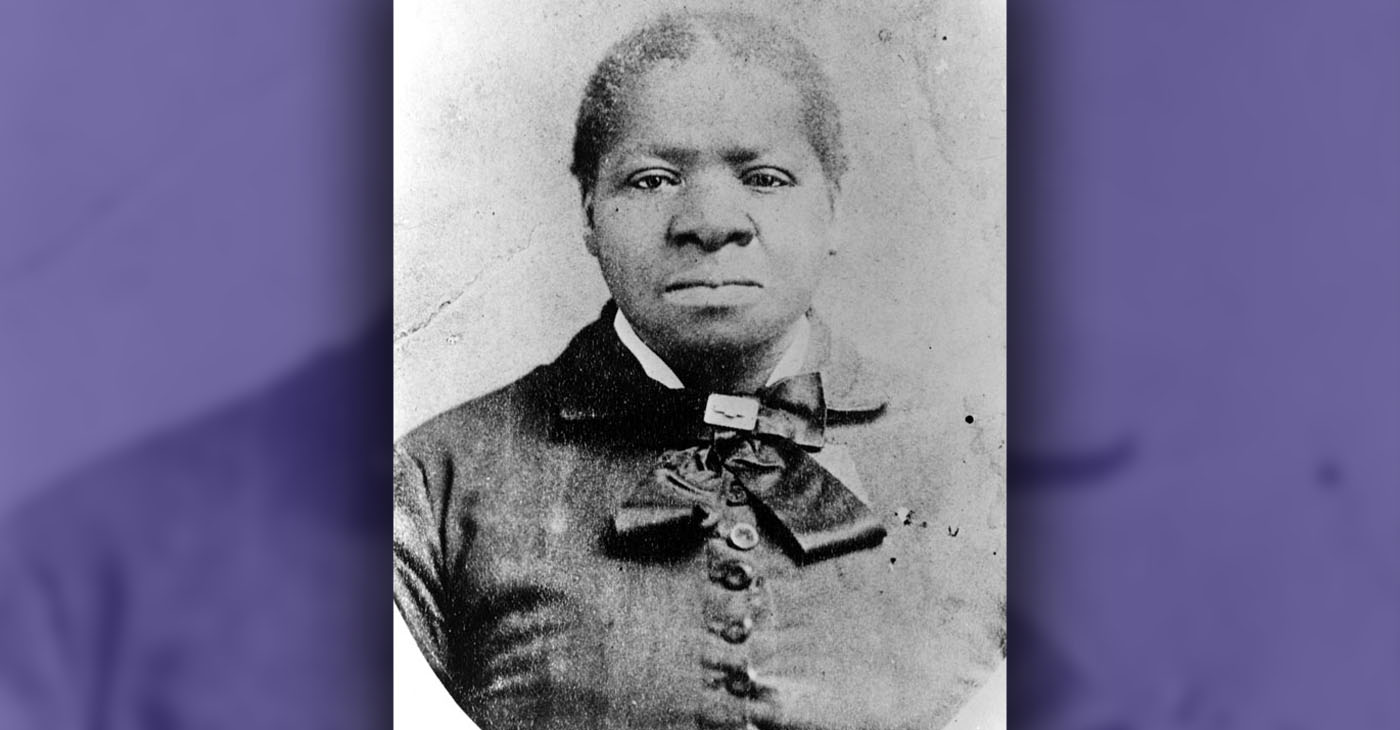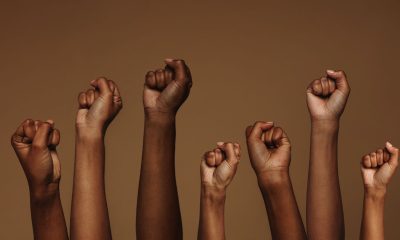Black History
Former Slave Bridget “Biddy” Mason, Los Angeles Real Estate Mogul
After 10 years of freedom, working hard and saving her money, Bridget “Biddy” Mason (1818–1891), in 1866, purchased two lots on the outskirts of Los Angeles, which was a small pueblo at the time. She paid $250 for the Spring Street property; the first piece of land Mason owned. This is said to have been a “remarkable feat for a woman having spent the first 37 years of her life enslaved.” But she wouldn’t settle for it being the last. She would become a savvy businesswoman.

By Tamara Shiloh
The state of California joined the Union in 1850 as a free state. But after spending five years enslaved there, Bridget “Biddy” Mason (1818–1891) challenged her owner, Robert Smith, for her freedom.
In 1856, a Los Angeles district judge approved Mason’s petition, a ruling that freed Mason and 13 members of her family. She then made Los Angeles her home.
Not much is known about Mason’s earlier life. She was born into slavery, likely in Georgia. She was owned by slaveholders in Georgia and South Carolina before being returned to Mississippi where, as a young adult, she was enslaved in the Smith home. She cared for Smith’s sickly wife and the couple’s children, becoming a nurse and midwife, work she continued throughout most of her life.
After becoming free, Mason met John Griffin, a white Southern doctor who was impressed with her midwife and nursing skills. She began working for him, delivering hundreds of babies in Los Angeles. In her medicine bag, she carried the tools of her trade and the papers the judge had given her affirming that she was free.
After 10 years of freedom, working hard and saving her money, Mason, in 1866, purchased two lots on the outskirts of Los Angeles, which was a small pueblo at the time. She paid $250 for the Spring Street property; the first piece of land Mason owned. This is said to have been a “remarkable feat for a woman having spent the first 37 years of her life enslaved.” But she wouldn’t settle for it being the last. She would become a savvy businesswoman.
In 1884, Mason sold the north half of her first property for $1,500. On the other half, she built a two-story brick building for rentals. That same year she sold another lot for $2,800. She also helped her family buy properties around the city. In 1885, she deeded a portion of the Spring Street property to her grandsons. She signed the deed with an X because she had never learned to read or write.
Mason organized what is now the oldest African American church in Los Angeles: First A.M.E. Church. She used her wealth to give back to and support the entire community, donating to numerous charities, feeding and sheltering the poor, visiting prisoners, and was instrumental in founding an elementary school for Black children.
At the time of her death in 1891, Mason had amassed a fortune of $300,000 (approximately $6 million today), making her the “richest colored woman west of the Mississippi.” She was buried in an unmarked grave in Evergreen Cemetery.
In 1988, the mayor of Los Angeles and members of the church she founded held a ceremony, during which time her grave was marked with a tombstone. More importantly, Mason left a legacy of perseverance, compassion, and triumph.
Encourage young readers to learn more about this real-life champion for civil rights who was born into slavery in Arisa White, Laura Atkins and Laura Freeman’s “Biddy Mason Speaks Up.”
Activism
Oakland Post: Week of May 21 – 27, 2025
The printed Weekly Edition of the Oakland Post: Week of May 21 – 27, 2025

To enlarge your view of this issue, use the slider, magnifying glass icon or full page icon in the lower right corner of the browser window.
Activism
OPINION: Your Voice and Vote Impact the Quality of Your Health Care
One of the most dangerous developments we’re seeing now? Deep federal cuts are being proposed to Medicaid, the life-saving health insurance program that covers nearly 80 million lower-income individuals nationwide. That is approximately 15 million Californians and about 1 million of the state’s nearly 3 million Black Californians who are at risk of losing their healthcare.

By Rhonda M. Smith, Special to California Black Media Partners
Shortly after last year’s election, I hopped into a Lyft and struck up a conversation with the driver. As we talked, the topic inevitably turned to politics. He confidently told me that he didn’t vote — not because he supported Donald Trump, but because he didn’t like Kamala Harris’ résumé. When I asked what exactly he didn’t like, he couldn’t specifically articulate his dislike or point to anything specific. In his words, he “just didn’t like her résumé.”
That moment really hit hard for me. As a Black woman, I’ve lived through enough election cycles to recognize how often uncertainty, misinformation, or political apathy keep people from voting, especially Black voters whose voices are historically left out of the conversation and whose health, economic security, and opportunities are directly impacted by the individual elected to office, and the legislative branches and political parties that push forth their agenda.
That conversation with the Lyft driver reflects a troubling surge in fear-driven politics across our country. We’ve seen White House executive orders gut federal programs meant to help our most vulnerable populations and policies that systematically exclude or harm Black and underserved communities.
One of the most dangerous developments we’re seeing now? Deep federal cuts are being proposed to Medicaid, the life-saving health insurance program that covers nearly 80 million lower-income individuals nationwide. That is approximately 15 million Californians and about 1 million of the state’s nearly 3 million Black Californians who are at risk of losing their healthcare.
Medicaid, called Medi-Cal in California, doesn’t just cover care. It protects individuals and families from medical debt, keeps rural hospitals open, creates jobs, and helps our communities thrive. Simply put; Medicaid is a lifeline for 1 in 5 Black Americans. For many, it’s the only thing standing between them and a medical emergency they can’t afford, especially with the skyrocketing costs of health care. The proposed cuts mean up to 7.2 million Black Americans could lose their healthcare coverage, making it harder for them to receive timely, life-saving care. Cuts to Medicaid would also result in fewer prenatal visits, delayed cancer screenings, unfilled prescriptions, and closures of community clinics. When healthcare is inaccessible or unaffordable, it doesn’t just harm individuals, it weakens entire communities and widens inequities.
The reality is Black Americans already face disproportionately higher rates of poorer health outcomes. Our life expectancy is nearly five years shorter in comparison to White Americans. Black pregnant people are 3.6 times more likely to die during pregnancy or postpartum than their white counterparts.
These policies don’t happen in a vacuum. They are determined by who holds power and who shows up to vote. Showing up amplifies our voices. Taking action and exercising our right to vote is how we express our power.
I urge you to start today. Call your representatives, on both sides of the aisle, and demand they protect Medicaid (Medi-Cal), the Affordable Care Act (Covered CA), and access to food assistance programs, maternal health resources, mental health services, and protect our basic freedoms and human rights. Stay informed, talk to your neighbors and register to vote.
About the Author
Rhonda M. Smith is the Executive Director of the California Black Health Network, a statewide nonprofit dedicated to advancing health equity for all Black Californians.
Activism
IN MEMORIAM: Nate Holden, State Senator and Longtime Los Angeles Councilmember, Dies at 95
Los Angeles County Supervisor Janice Hahn described Holden as “a lion” in the State Senate and a force to be reckoned with on the Los Angeles City Council.” Hahn added that she learned a lot working with Holden when she was a new councilmember.

By Bo Tefu, California Black Media
Former Los Angeles City Councilmember Nathaniel “Nate” Holden, a prominent figure in the city’s politics, passed away at the age of 95, his family confirmed on May 7.
Holden, who represented South Los Angeles for 16 years on the City Council and served one term in the California State Senate, was widely regarded as a forceful advocate for his community.
Los Angeles County Supervisor Janice Hahn described Holden as “a lion” in the State Senate and a force to be reckoned with on the Los Angeles City Council.”
Hahn added that she learned a lot working with Holden when she was a new councilmember.
Holden’s journey to political prominence began in the segregated South, where he was born in Macon, Georgia, in 1929. He often recalled the childhood moment when he first heard the governor of Georgia vowing to continue suppressing Black people.
“Doing the best you can for the people. Law and order. Make sure that people’s communities are safe. I did it all,” said Holden, reflecting on his legacy.
Holden is survived by his sons, including former California Assemblymember Chris Holden, who represented a district in Southern California that includes Pasadena and Altadena in Los Angeles County and cities in San Bernardino County.
-

 Activism4 weeks ago
Activism4 weeks agoAI Is Reshaping Black Healthcare: Promise, Peril, and the Push for Improved Results in California
-

 Activism4 weeks ago
Activism4 weeks agoBarbara Lee Accepts Victory With “Responsibility, Humility and Love”
-

 Activism4 weeks ago
Activism4 weeks agoESSAY: Technology and Medicine, a Primary Care Point of View
-

 Activism4 weeks ago
Activism4 weeks agoFaces Around the Bay: Author Karen Lewis Took the ‘Detour to Straight Street’
-

 Arts and Culture4 weeks ago
Arts and Culture4 weeks agoBOOK REVIEW: Love, Rita: An American Story of Sisterhood, Joy, Loss, and Legacy
-

 Activism4 weeks ago
Activism4 weeks agoNewsom Fights Back as AmeriCorps Shutdown Threatens Vital Services in Black Communities
-

 #NNPA BlackPress4 weeks ago
#NNPA BlackPress4 weeks agoThe RESISTANCE – FREEDOM NOW
-

 Activism4 weeks ago
Activism4 weeks agoTeachers’ Union Thanks Supt. Johnson-Trammell for Service to Schools and Community



















































